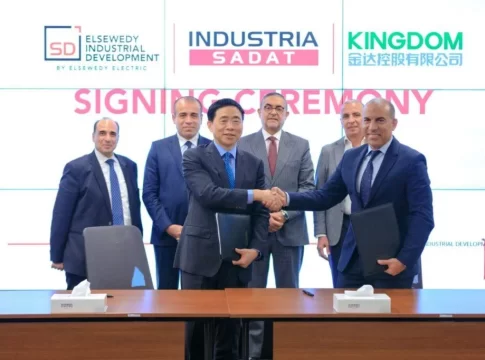Elsewedy Industrial Development, a subsidiary of Elsewedy Electric, has partnered with Kingdom Holdings of China. The two giants have inked a $60 million agreement to establish a private free zone in Egypt’s Industria Sadat, marking a significant milestone in industrial collaboration between the two corporations.
This partnership, facilitated by the Egyptian Commercial Service (ECS) and the General Authority for Investment and Free Zones (GAFI), will pave the way for a 50,000-square-meter facility dedicated to advanced textile production. Signing the agreement were Mohamed AlKammah, CEO of Elsewedy Industrial Development, and Ren Weiming, Chairperson and CEO of Kingdom Holdings.
Mohamed AlKammah expressed optimism, stating, “The development will not only diversify the industrial landscape of the Sadat Industrial City but also enhance Egypt’s competitive edge in the global textile market.” Ren Weiming mirrored this sentiment, highlighting the project as Kingdom Holdings’ first venture in Egypt, signaling potential for future investments.
The project aligns with Egypt’s national strategy to bolster the industrial sector, boost exports, and deepen economic ties with China. Notably, textile exports from Egypt reached $1.2 billion in 2023, with projections aiming for $1.4 billion by 2025. This growth is part of Egypt’s ambitious vision to double textile and garment exports by 2026.
Set to commence operations in 2026, the new factory will boast an annual production capacity of 5,000 tons of flax yarn. It’s expected to generate $300 million in sales and create 1,500 jobs, significantly contributing to local employment and economic growth.
Yahya ElWathik Bella, Minister Plenipotentiary and Head of the Egyptian Commercial Service, underscored the importance of international partnerships in enhancing the competitiveness of Egyptian products. The collaboration with advanced Chinese textile technologies is expected to set new benchmarks for Egyptian manufacturing.
Furthermore, Hossam Heiba, CEO of GAFI, emphasized the authority’s efforts to integrate the private sector into key industries. “This project is a testament to our commitment to fostering significant foreign investments that align with Egypt’s economic vision,” he noted.
The strategic partnership grants Egyptian textiles access to an expansive market of 3 billion consumers worldwide, thanks to a network of trade agreements. This global reach is poised to elevate Egypt’s standing in the international textile trade.


